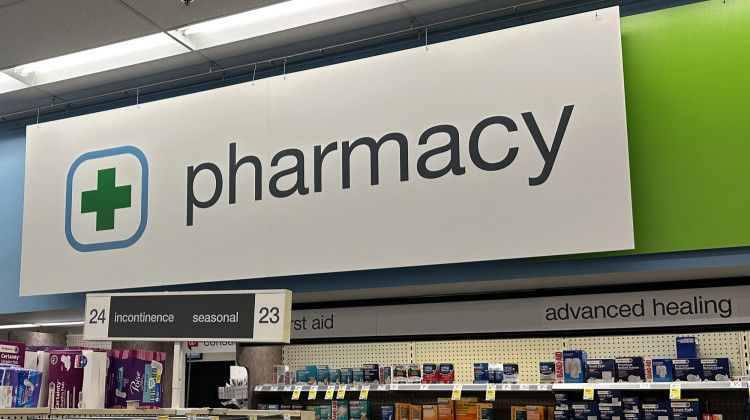
BU Wellness Network hosts many community outreach events, taking the mobile unit out to provide HIV/STI screening, fresh produce and other resources.
Photo provided/BU WellnessMarch 18-22 is LGBTQ+ Health Awareness Week and here’s what local organizations are doing in Indianapolis.
For those who identify as LGBTQ+, finding a primary care doctor or access to mental health counseling is often difficult, if not impossible.
“Discrimination in health care is real for LGBTQ folks. We’ve seen this recently with Senate Bill 480 going into effect which denies LGBTQ minors gender affirming health care in Indiana,” Chris Paulsen, CEO of Indiana Youth Group, said. “Not only does it deny them care, it limits their doctor’s ability to be able to refer them out for care.”
Founded in 1987, Indiana Youth Group is a drop-in center for LGBTQ+ youth and their straight ally friends ages 12-24, Paulsen said. Once a month, IYG offers HIV/STI testing and partners with different local health care providers who bring mobile clinics with doctors onsite to offer physicals and vaccinations and write prescriptions for PrEP.
IYG also offers education services to help teens and young adults get back to school or apply for colleges, as well as onsite laundry services, cleaning and hygiene products, clothing and showers, rapid rehousing, and transportation assistance.
Jasmine Black, executive director of BU Wellness Network, said the organization, founded in 1999, focuses on the Black community and those living with HIV — offering support groups, free HIV/STI and pregnancy screenings, free condoms and lubricants, and emergency funding for housing insecure individuals living with or at high risk of HIV.
“What I always hope is that people receive all the care that they need in the way that they need to receive it,” Black said. “Getting tested is—when you actually get in there and do it, isn’t a terrible process at all. It’s very quick and easy and there’s lots of support, especially from my team, to wrap around anybody who’s fearful or needs some more education or any additional support should they test positive for anything that we can test them for.”
BU Wellness Network also partners with Q Care Plus for telehealth services to make access to PrEP easier. Clients can attend telehealth appointments and have medication delivered to the office for pick up or be referred out to Transformations Counseling Services for mental health resources, Black said.
Beyond the office, BU Wellness Network is out in the community offering support services, fresh produce and rapid testing for HIV and syphilis through their mobile unit.
“Everywhere the mobile unit can go, we’re at,” Black said. “We will set up shop in a parking lot at a nearby church, or a park, or a library and have a DJ out, have some food going on the grill, and offer those free fresh produce, the testing services and then [a] table to show people a variety of other services that we have.”
Mental health resources are one of the most difficult services for Black and LBGTQ+ youth and young adults to access, Paulsen and Black said. Although BU Wellness refers out to other LGBTQ+ friendly and affirming organizations for help, Indiana Youth Group has five mental health counselors and two master’s level interns on staff.
Clients are able to book with one of the counselors over a period of 8-10 weeks, Paulsen said. The free short-term strength-based therapy sessions can help individuals address a few issues, whether at home, work or school, and help them find long-term care.
In addition to mental and physical health care, BU Wellness Network and Indiana Youth Group prioritize addressing food insecurity in the LBGTQ+ community. Many food pantries in the city are held in churches or are not accepting or affirming of LGBTQ+ individuals, Paulsen said, which can make access to healthy, fresh food even more difficult for those in the community.
This pantry will be open seven days a week during office hours for anyone in the community regardless of income.
“We have a food pantry that’s available to anyone 12 to 24 so they can access healthy food,” Paulsen added. “Our office is at 38th and Meridian, so we’re in the middle of a food desert. So, it’s very important that our neighbors and our clients have access to that food.”
Indiana Youth Group’s food pantry is open seven days a week.
A food pantry specifically for individuals living with HIV is also available at BU Wellness Network through the Ryan White Program.
Knowing where to start when it comes to getting the care you need can be scary; however, access to food, counseling, testing and preventative care is critical to living a longer, healthier life, Black said.
“I think just taking that step and accessing care, focusing on your own health—it can be scary to reach out and try to find that care, but it’s so important that we do that,” Paulsen said. “We know that when diseases or conditions are discovered early, they’re a lot easier to treat than if they go untreated.”
For more information about BU Wellness Network and upcoming events, visit buwellness.org or contact 317- 931-0292. For more information about Indiana Youth Group, visit indianayouthgroup.org or contact 317-541-8726.
 DONATE
DONATE






 Support WFYI. We can't do it without you.
Support WFYI. We can't do it without you.